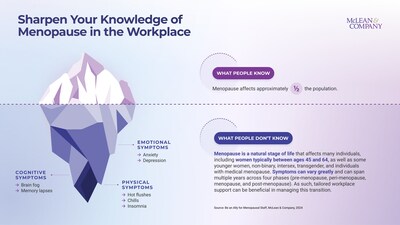The global HR research and advisory firm has
published a new resource that suggests that when organizations
enable menopausal staff to thrive, the benefits extend beyond the
individual employee to the broader organization. Benefits cited
include increased retention and productivity as well as improved
morale and communication.
TORONTO, April 24,
2024 /PRNewswire/ - As the conversation surrounding
menopause in the workplace continues to gain traction, many
organizations still lack critical support systems to ensure
employees who are experiencing menopause have the resources they
need to succeed. In response to the lack of training and education
as well as discomfort discussing the topic, McLean &
Company has published its new guide, Be an Ally for
Menopausal Staff. The global HR research and advisory
firm's resource has been designed to empower people leaders to
become allies for menopausal staff by enhancing their
understanding, fostering inclusivity, seeking out unique ways to
offer support, and cultivating positive team relationships.

"We know that menopause affects women, individuals with
medical menopause related to personal health needs, as well as some
non-binary, intersex, and transgender people. This means
approximately half of the workforce is impacted by
menopause," says Karen
Mann, senior vice president, Human Resources Research,
Learning & Advisory Services at McLean & Company. "While
there is often more support for menopause in the workplace in
regions such as Northern Europe,
New Zealand, and Australia, menopausal support is critically
lacking in North American environments. People leaders play a key
role in helping all staff thrive, so they must take a proactive and
informed approach to dispel any misconceptions they may have and
strengthen their understanding of the common challenges menopausal
staff may face."
Menopause is a natural stage of life with symptoms that can vary
greatly, including emotional symptoms like anxiety and depression,
cognitive symptoms such as brain fog and memory lapses, and
physical symptoms like hot flushes, chills, and insomnia, the new
HR resource explains. These challenges can span multiple years
across four phases, which are pre-menopause, perimenopause,
menopause, and post-menopause, and can be managed through
tailored workplace support.
"Menopause can impact a person's working life, but it does
not diminish their ability to perform their job effectively,"
shares Michelle Courneyea,
research analyst at McLean & Company. "Being an ally for
menopausal staff is no different from supporting any other team
member and requires prioritizing inclusion. It's important to
remember that inclusive practices benefit everyone; they may just
need to be fine-tuned to meet team members' unique needs."
McLean & Company has identified five key actions people
leaders can take to create a workplace environment in which
menopausal employees can thrive, as outlined below:
- Inform. Leaders must first develop their knowledge
of menopause and mitigate any biases they may have. This looks like
challenging their own assumptions, consulting organizational
resources, learning from others, and conducting their own
research.
- Empathize. Use emotional intelligence to build
trusting coworker relationships. Doing so requires leading with
empathy, respecting team members' privacy and confidentiality, and
creating opportunities for employees to connect with people leaders
to safely share experiences and voice concerns.
- Understand needs. As a leader, it is important to
understand that menopause experiences are unique to the individual.
Recognizing behaviors that may impact work-life balance and may be
tied to menopausal symptoms, such as reduced participation in team
meetings or frequent yawning and irritability due to insomnia, is a
key step to proactively supporting employee needs.
- Accommodate. Supporting menopausal staff enhances
both individual and organizational success. By providing tailored
support, such as flexible working hours, modified working
locations, or adjusted deadlines, leaders can improve employee
morale and inclusivity within the team.
- Advocate. To be an ally for menopausal staff, leaders
must champion menopausal awareness and be role models for how other
team members can support employees experiencing menopause. Raising
awareness about menopause requires keeping the team informed by
sharing relevant resources, standing up for menopausal staff by
addressing comments that create an opportunity to educate, and
celebrating ally behaviors through positive reinforcement and
recognition.
As people leaders work to understand how to best support staff
experiencing menopause, McLean & Company reminds them that lack
of awareness, confidence, and policies are common obstacles that
can be overcome by taking an intentional and inclusive approach.
When leaders commit to leading with empathy and understanding to
support menopausal staff, advocating for tailored assistance, and
promoting an inclusive environment where everyone feels valued,
both the employees and the organization will benefit.
To access the full resource, please visit Be an Ally for
Menopausal Staff.
The firm is also pleased to offer its spotlight resource,
Overcoming the Taboo: Menopause in the
Workplace.
To attend upcoming free webinars on a variety of topics or
explore the publicly available archive of recorded sessions, please
visit McLean & Company's webinars page.
Please note that a selection of McLean & Company's
research-based webinars are now offering professional
development credits for recertification with SHRM, HRCI, and
HRPA.
Media interested in connecting with McLean & Company
analysts for exclusive, research-backed insights and commentary on
psychological safety in the workplace, DEI, generative AI in
HR, HR trends in 2024, the future of
work, and more can contact Senior Communications Manager
Kelsey King at
kking@mcleanco.com.
About McLean &
Company
Through data-driven insights and proven best-practice
methodologies, McLean & Company offers comprehensive
resources and full-service assessments, action plans, and training
to position organizations to meet today's needs and prepare for the
future.
McLean & Company is a division of Info-Tech Research
Group.
Media professionals can register for unrestricted access to
research across IT, HR, and software and hundreds of industry
analysts through the firm's Media Insiders program. To gain access,
contact kking@mcleanco.com.
 View original content to download
multimedia:https://www.prnewswire.com/news-releases/menopause-impacts-more-than-half-the-workforce-but-menopausal-support-in-the-workplace-is-critically-lacking-new-insights-from-mclean--company-302126224.html
View original content to download
multimedia:https://www.prnewswire.com/news-releases/menopause-impacts-more-than-half-the-workforce-but-menopausal-support-in-the-workplace-is-critically-lacking-new-insights-from-mclean--company-302126224.html
SOURCE McLean & Company